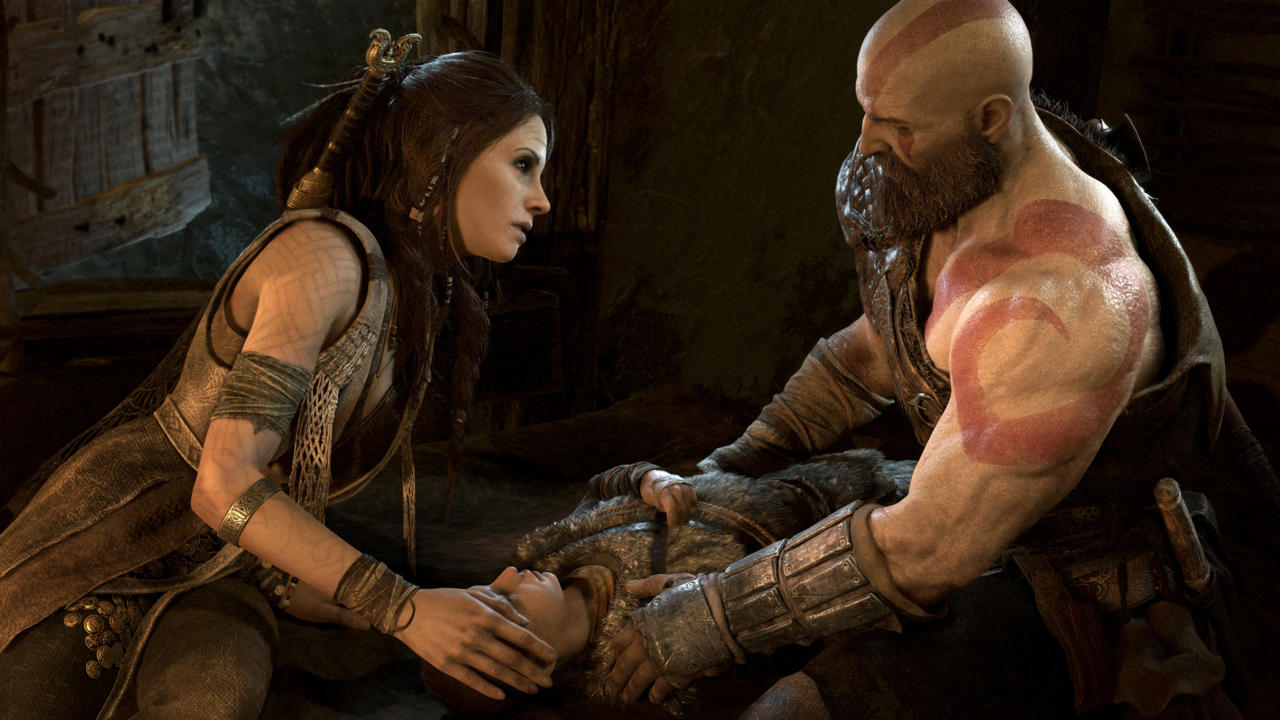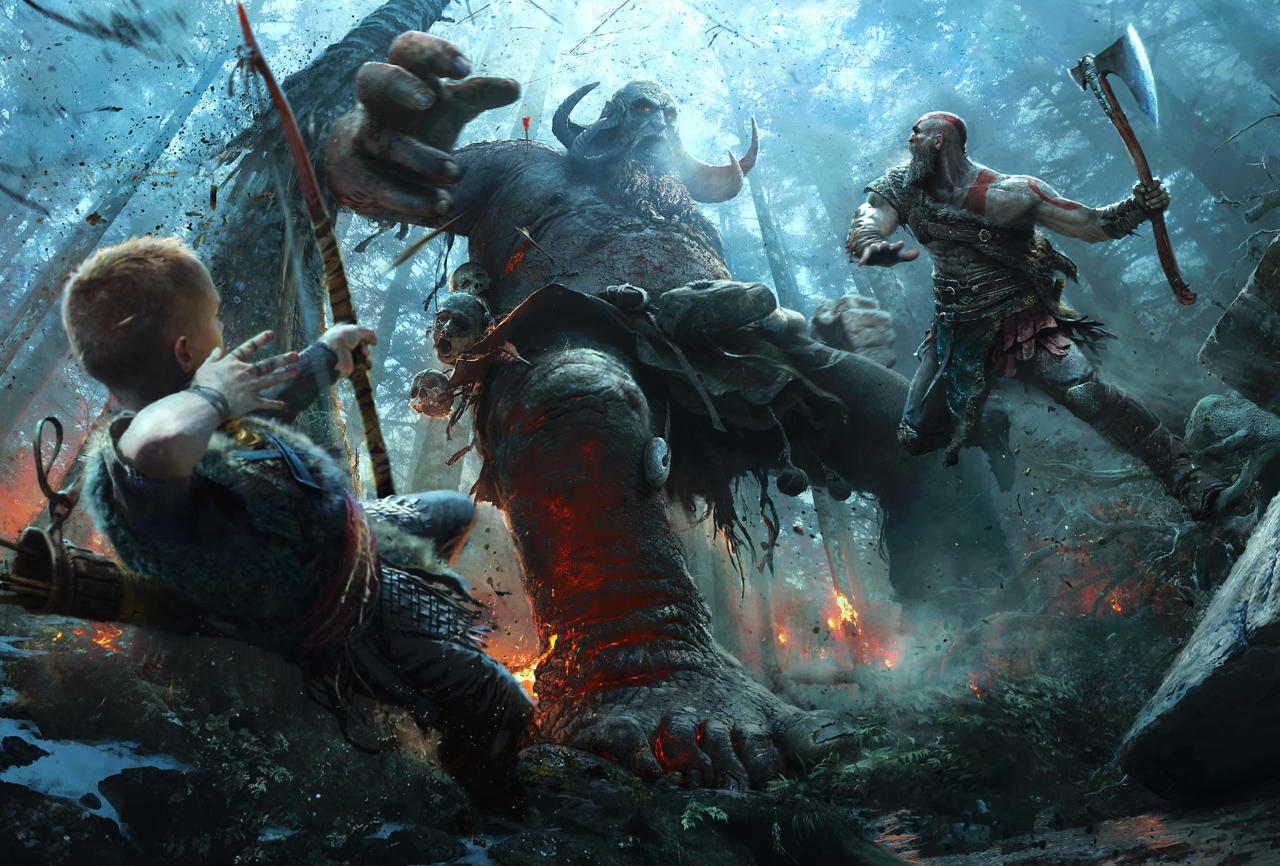The opening track to God of War begins with dark, pounding percussion and a deep, male choir chanting a series of ominous notes. It's a repeating motif that perfectly speaks to the Kratos we've known for decades, a brutal god-slaying monster. But there's another motif that accompanies it, a more uplifting series of horns and strings that seem almost hopeful. It hints at a calmer Kratos, though still prudent and stoic--it's the side of him that we see executed so superbly in this new game in his interactions with his son, Atreus. But the hook of the deep ominous chants remains, like the Ghost of Sparta that still haunts Kratos, and it's a sound that will continue to haunt you throughout God of War.
The idea of somehow instantly hooking an audience with a note or sound that stays with them long afterward has always stuck with Bear McCreary, and was a key factor in creating the soaring and emotional score for God Of War. It was a concept passed down by his mentor of almost ten years, Elmer Bernstein, the legendary composer of The Magnificent Seven, The Great Escape, and Ghostbusters, among others. "I always strive to find a sound or instrument that can hook the audience instantly and in this, God of War is arguably an embarrassment of riches. Between the Nordic instruments, choirs, vocal soloists, percussion and the huge orchestra, there are many different sounds fighting for your attention. However, I must say that I think the 3-note low male choir phrase that begins the main theme are probably 'the thing' that will hook people the fastest. When I first played the theme for Santa Monica Studio and Cory (Barlog, creative director), they remarked instantly on that sound. Something about it evokes Kratos instantly. I felt very fortunate to have stumbled on to such an effective idea, so early in the creative process."
Minecraft – Kung Fu Panda DLC Trailer Sclash - Console Release Date Trailer Kingdom Come: Deliverance 2 - Official Cinematic Announcement Trailer Stellar Blade - BIBI ‘Eve’ Official Music Video Trailer | PS5 Apex Legends: Urban Assault Collection Event Trailer Total War: WARHAMMER III - Elspeth von Draken Gameplay Showcase Potionomics: Masterwork Edition - Official Announcement Trailer Genshin Impact - "Arlecchino: Sleep in Peace" | Official Character Teaser Snowbreak: Containment Zone - "Gradient of Souls" Version Trailer Harold Halibut GameSpot Video Review Nancy Drew: Mystery of the Seven Keys | World Premiere Official Trailer Modern Warfare III & Warzone - Official Cheech & Chong Bundle Gameplay Trailer
Please enter your date of birth to view this video
By clicking 'enter', you agree to GameSpot's
Terms of Use and Privacy Policy
But that early acknowledgment is no surprise considering the experience behind the composer who wrote it. McCreary's career has already reached legendary status with his immediately recognizable work on The Walking Dead (including THAT theme music) and Battlestar Galactica. He won an Emmy Award for his work on Da Vinci's Demons and the Cloverfield movie franchise is now safely in his hands. Agents of S.H.I.E.L.D., Black Sails, Outlander and Black Mirror all combine to make McCreary not only one of the most prolific composers working today, but one that has creeped into your subconscious without your knowledge. For a composer, that's a success.
Carving out an identity in music is not an easy task, so McCreary puts the tools into each job by looking at storytelling and character. "I always strive to find a musical approach that inherently draws inspiration from the story it is supporting. In the case of God of War, I strove to use Nordic folk instrumentation, languages, voices and musical modes to help transport the audience. I was inspired to write for instruments such as the Nyckelharpa and Hardanger Fiddle, because the process of exploring their strengths and weaknesses inevitably led me to discover new forms of musical expression."
Making your own way in the world but knowing the importance of a parental bond is one of the key themes of this new rebirth of God Of War. After being first contacted by Santa Monica Studio in 2014, McCreary's work on the game evolved over a period of years and throughout that time, he had a very personal influence to draw from which paralleled the journey of Kratos. "I had just become a father when I first was hired and my parental experience in the intervening four years has changed my life forever. This life experience was a huge influence on my work for God of War, perhaps in ways buried too deep in my subconscious for me to even be aware of. Practically every musical decision I made for the score was influenced by the relationship between Kratos and Atreus. Parental themes are rarely explored in video games, which helps set this story apart."

From the blind, one-dimensional rage that inhabited the young ghost of Sparta back in the PlayStation 2 days, 2018 has turned him on his head to develop layers of personality, empathy and depth in a character that had arguably reached his natural conclusion on the PlayStation 3. For McCreary, this revolutionary new direction played into the title track he wrote (and performed at E3 2016) and helped give him a clear vision of what he wanted to achieve with the overall score. "When I wrote that theme I was trying to communicate vital and often conflicting, information about Kratos. He is still the same character from the classic games. He retains that rage and power, simmering beneath his stern exterior. That's where the bombastic brass, pounding percussion and deep, male vocals helped. But more importantly, I wanted to communicate that he is older, wiser and calmer now. There are more layers to his storyline. Put simply, he is just a more mature character now. So to communicate that, I included his theme harmonic and melodic components that are quite beautiful, occasionally even soaring. The combination of visceral, powerful instrumentation with lyrical, soaring melodies and chord progressions is something I hope resonates with audiences."
In addition to the pounding bombast and deep choir voices that are typically associated with God Of War, McCreary also wrote numerous somber pieces that look to the past of the franchise while also giving Kratos and his son moments of wistful and perhaps mournful connection. Tracks like 'Echoes Of An Old Life', 'The Healing' and 'Memories Of Mother' have a quiet introspection to them that would have seemed ludicrous for this character when he was spending his time cutting off heads and enjoying quicktime-event sex scenes back in 2007.
There's a distinct sense of growth and self-reflection here, both with McCreary's work and the God Of War franchise itself. A lot of that has come about simply because of the four year lifespan of the music. "The score has evolved immeasurably," says McCreary, "and in some ways that evolution represents a move back towards a sound that is more consistent with the older games of the franchise. My first stab at a theme for God of War was a lonely, melancholy tune for female voices and Nyckelharpa. I was inspired by the new story arc for Kratos, and his relationship with his son. It was heartbreaking!"

"Ultimately, we realized it was simply too sad and subdued to function as the primary theme for Kratos, and for the game, so I put it away. That original theme I composed still ended up in the game, however, becoming the primary theme for Kratos and his Atreus, representing their family storyline specifically. The theme is featured prominently on the soundtrack album in the cue 'Memories of Mother' and ultimately heard in the game almost as much as the main theme."
Travelling to Iceland to record choir voices, McCreary felt an incredible sense of belonging to the Nordic influence of the game. He spent time walking around local glaciers and waterfalls to feel the mythological history of the area. Using Swedish and Norwegian instruments that date back to the 14th century helped push the score to a place that McCreary felt it couldn't have reached otherwise.
If that wasn't enough, the collaboration with Faroese throat singer and musician Eivør Pálsdóttir lent a further level of authenticity on many of the tracks and opened new avenues of collaboration for the composer. "Eivør was a fantastic creative partner, and she brought a whole new level of personality to the music. I was thrilled with the vast dynamic and emotional range her singing voice provided. High, ethereal angelic tones to deep, guttural, percussive bursts. I learned a lot about collaboration on this project. A game score this immense is vastly more complex from a logistical standpoint than a typical film score. Teams of music editors, producers and engineers worked on this score for nearly a year after primary recording was completed in order to integrate it into the game in an impactful way."

McCreary still enjoys this process in his own work to some extent. "I enjoy listening to my previous work, though I don't do it very often. I like to take a moment to recognize how much I've grown as a composer. I'm always looking forward but it's fun to sometimes listen back to older scores and recognize a job well done. The score to Capcom's Dark Void is still one of my greatest melodic achievements, and I am flooded with emotion when I hear it again."
The transformation of Kratos from angry, one-trick god to stern yet responsible father coupled with a parental bond being the key story theme for an entire game is remarkable. In tandem, Bear McCreary's personal connection to this journey over almost half a decade of his career has delivered a collection of emotionally thunderous music which soars through the rebirth of this franchise with confidence and grandeur without forgetting to hook the audience from the beginning. With three simple notes.